
SDG 15: LIFE ON LAND
Aims at the conservation and sustainable use of land resources, which have targets, among others: (i) maintaining conservation and restoration and utilization of water and land systems in line with international agreements; (ii) implement management of all forest types; (iii) combat desertification, restore degraded land etc. As a whole, “environmentally friendly behavior” reflected in the other SDGs goals is closely related to the conservation efforts targeted in Goal 14. Preservation of Marine Ecosystems and Goal 15. Preservation of Land Ecosystems.
Supporting land ecosystems through education
- Events about sustainable use of land
- Sustainably farmed food on campus
- Maintain and extend current ecosystems' biodiversity
- Educational programmes on ecosystems
- Sustainable management of land for agriculture and tourism (educational outreach)
1) Community service program to preserve mangrove area

Mangroves are an essential ecosystem in coastal areas, so they can protect against various potential disasters, such as wind and tidal waves, and reduce the impact of tsunamis. The Padjadjaran University Lecturer Team held a community service program to encourage knowledge, awareness and community participation in supporting environmental sustainability, especially the preservation of mangrove areas on the coast. The socialization held on November 25 2022, has the theme “The importance of mangrove areas for fisheries resources.”
Community service program to preserve mangrove area
2)Unpad and Fokushimti Hold “The Landformation 2022
The Soil Science and Land Resources Professional Student Association, Faculty of Agriculture, Padjadjaran University, in collaboration with the Communication Forum of the Indonesian Soil Science Student Association, held the “The Landformation X JITI 2022.”
This activity consists of various events, starting with soil science competitions, national webinars, and community service activities. It raised soil science students’ awareness of Indonesian agriculture.
In a release to the Unpad Media Channel, “The Landformation x JITI 2022” carries the theme “Trilogy (The Role of Millennial Farmers for Land Observation Technology)”, with the hope of increasing knowledge and understanding regarding the role of millennial farmers in land observation technology, establishing and strengthening friendship between various parties, as well as implementation of the higher education tridharma.
3)Revegetation of the reservoir area
To maximize water conservation, Padjadjaran University, together with the Unpad Palawa Foundation, planted tree seedlings in the “Leuwi Padjadjaran 2” reservoir area on the Unpad Campus, Jatinangor. There were 154 tree seedlings planted. This activity is also part of revegetating the reservoir area as abundant water retention in the Unpad campus environment, both from surface water and springs.
1)Unpad sustainable livestock technopark

Padjadjaran University collaborates with Pt. Charoen Pokphand Indonesia, in the building, closed house facilities for broiler chickens. This facility is part of the sustainable livestock technopark system developed by the Unpad Faculty of Animal Husbandry. The general public can access the closed house. There are even non-degree education programs in the form of training, MOOCs, and even short courses that can be taken by livestock or the general public.
Unpad sustainable livestock technopark
2)Halal canteen
To guarantee quality food for students and the academic community, Unpad developed a halal and Tayib (Thayib) campus canteen. This canteen is located at GOR Santika, Jatinangor Campus, which is the main campus of Unpad. The soft launching of this canteen was held on October 4 2022, in collaboration between the Padjadjaran Halal Center and Bank Indonesia. As many as 34 canteen business actors were also involved in training on how to produce good food, such as choosing halal product raw materials, using supporting equipment, and creating processes that comply with halal standards. This canteen is open to all Unpad residents and operates from 08.00 to 18.00.
3)Policy of canteen management
The principles of canteen management are as follows:
- Maintaining the quality of food and beverage products served in the canteen, as well as providing friendly and efficient service to customers;
- Providing a variety of menu options for a variety of tastes, special dietary needs, and food preferences;
- Complying with applicable food safety standards, including storing, processing, and managing food safely to prevent contamination and disease;
- Providing quality raw materials by ensuring a consistent supply and selecting sustainable raw materials.
Regulation of canteen management
1)Release of Protected Animals (turtles)

Turtles in Indonesia are experiencing quite serious and worrying threats, mainly due to the taking of turtle eggs for trade, the capture of turtle mothers, and the death of turtles accidentally caught by fishermen. Padjadjaran University’s PSDKU Tropical Marine Fisheries study program, together with the Head of Marine Affairs, West Java Marine Fisheries Service, the leadership of the Marine, Fisheries and Food Security Service of Pangandaran Regency released the hatchlings as part of the conservation of protected animals in the Legokjawa Village Aquatic Conservation Area, Cimerak District, Regency Pangandaran. This activity will be held on September 21 2022
Release of Protected Animals (turtles)
2)Unpad Street Feeding Animal Friend (UnpadSF) installed reflective collars on street cats
Unpad Street Feeding Animal Friend (UnpadSF) installed reflective collars on street cats in the Padjadjaran University Jatinangor campus and Jatinangor sub-district area on Monday, 8 August 2022. This activity was done to commemorate International Cat Day. This unique collar can reflect motor vehicle lights in low light conditions, which will help the driver see the position of the cat wearing this reflective collar. This collar is a solution to prevent potential accidents between motorized vehicles and street cats at night.
Unpad Street Feeding Animal Friend (UnpadSF) installed reflective collars on street cats
3)Tree planting at World Tree Day
In commemoration of World Tree Day, BEM Kema Fikom Unpad planted 150 trees near the spring of Gunung Geulis, Sumedang, West Java, on Sunday, 20 November 2022. The types of trees planted include 85 mahogany seeds, 50 suren trees, 10 picung trees, and five palm trees. This grounded Fikom work program activity was attended by 30 Fikom Unpad students who collaborated with the Fikom Unpad Activist and Lovers Activist (KAPPA) club and the Gunung Geulis Communication Forum.
1)Group dynamics training and animal feed management training for livestock
The Faculty of Animal Husbandry, Padjadjaran University, provides group dynamics and animal feed management training for livestock groups in Gudang village, Tanjung Sari District, Sumedang. This training will be held on December 22 2022, at the Gudang Village Hall. This training was conducted with the Faculty of Animal Husbandry, Padjadjaran University and the Gudang Village Government. This training on how to feed sheep will increase the growth of livestock; besides that, the animals will not be susceptible to disease and will increase their selling value.
Group dynamics training and animal feed management training for livestock
2)socialization on milk goat farming
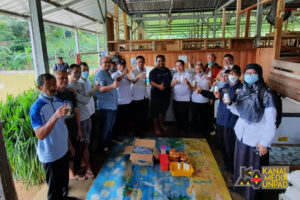
The Faculty of Animal Husbandry, Padjadjaran University, held a socialization on milk goat farming to the community of Cibungur Village, Rancakalong, Sumedang, on Wednesday 19 January 2022. This activity was carried out to convey the potential for milk goat cultivation. Training is held so farmers can manage cultivation effectively and efficiently, provide quality feed, and process livestock waste into quality fertilizer. Participants in this training consisted of livestock groups, representatives of Karang Taruna, LPM, and the Village Representative Body. After the training, the resource persons and participants made a direct visit to the Cibungur Farm farm.
socialization on milk goat farming
3)Training on the management of providing animal feed to sheep and green grass for sheep feed
The Faculty of Animal Husbandry, Padjadjaran University, provided training on the management of delivering animal feed to sheep and green grass for sheep feed to the community and livestock groups in Aua Desa Cinanjung, Tanjungsari District, Sumedang on Thursday 14 July 2022. This training was held as an implementation of the Unpad KKN-PPM implementation 2022 as a form of community empowerment activities, especially in animal farming and agriculture, a collaboration between the Unpad Faculty of Animal Husbandry and the Cinanjung Village Government. This training aims to improve the quality of breeders in Cinanjung Village, especially in making feed, to make it easier and increase the production of breeding and fattening breeders. This training is necessary so people can choose good sheep breeds, good feed and pen management, and adapt to existing local potential.
Training on the management of providing animal feed to sheep and green grass for sheep feed
1) The Faculty of Agriculture at Universitas Padjadjaran
The faculty of agriculture , Universitas Padjadjaran was officially established on September 1, 1959. This faculty is highly committed to contributing to developing the agricultural sector in Indonesia. Initially, the faculty secretariat was located at Jalan Dipati Ukur No. 37 Bandung, with the classes spread throughout different areas. Later on, the administration was moved to Jatinangor in September 1986. The Faculty of Agriculture at Universitas Padjadjaran offers a variety of study programs, including undergraduate, postgraduate, and vocational programs. The study programs are set to develop the productivity, quality, and efficiency of the nation’s agriculture sector, as well as to support its sustainability.
The Faculty of Agriculture at Universitas Padjadjaran
2)Webinar of digitizing sustainable tourism development from an economic, social and spatial perspective
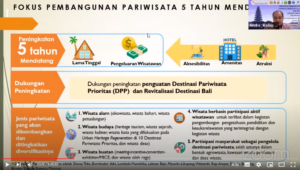
Master of Applied Economics, Faculty of Economics and Business, Padjadjaran University held a webinar on digitizing sustainable tourism development from an economic, social and spatial perspective. This event will be held on September 15, 2022, with resource person Prof. Dr Nunuy Nur Afiah (Dean of the Faculty of Economics and Business UNPAD), Dr H. Sandiaga S. Uno., MBA (Minister of Tourism and Creative Economy/Head of the Tourism and Creative Economy Agency), Andre Notohamijoyo, Ph. D (Assistant Deputy for Disaster and Social Conflict Mitigation, Coordinating Ministry for Human Development and Culture), Ridwan Sutriadi., PhD (SAPPK PWK ITB and discussant of the book “Bali Sailing amid the Covid-19 Storm”), Titik Anas., PhD ( Special Staff of the Ministry of Finance and FEB UNPAD) and I Gusti Agung Ngurah Suryana (Head of the Regional Government Tourism Service, Tabanan Regency, Bali Province).
3)Tourism research in Indonesia and Malaysia
The Postgraduate School of Padjadjaran University collaborates with the Faculty of Nature Bina and Measure Universiti Teknologi Malaysia regarding tourism research in Indonesia and Malaysia. A total of six research themes will be carried out jointly between Unpad and UTM.
Supporting land ecosystems through action
- Sustainabile use, conservation and restoration of land (policy)
- Monitoring IUCN and other conservation species (Policies)
- Local biodiversity included in planning and development
- Allien species impact reduction (policies)
- Collaboration for shared land ecosystems
Conservation of biological and non-biological natural resources in the Unpad environment is carried out by:
a. Protection of life support systems;
b. Preserving the diversity of plant and animal species and their ecosystems;
c. Sustainable use of biological and non-biological natural resources;
d. Optimal, integrated and sustainable management of energy resources, as well as
efficient use of energy in all sectors;
e. The tri dharma activities of higher education are wise and sustainable as well as pay attention to the sustainability of biological and non-biological resources.
Rector Regulation concerning the conservation of biological and non biological resources
The invasive species referred to in this Rector Regulation are native and non-native species which colonize a habitat massively, which can cause ecological, economic, and social losses, especially at UNPAD. Control of invasive species is carried out by Risk analysis and Application of invasive risk status.
Application of invasive risk status as referred to in paragraph (1) point b which has been determined as invasive species, then Eradication is carried out on the entry of the species. (4) he application of invasive risk status to prevent its spread is carried out through the following methods: a. Eradication; b. Extermination; c. Prevention of the spread through population control.
Rector Regulation concerning control of invasive alien species
1)Development of Tourism Villages in Sindangsari, Sumedang based on local natural resources
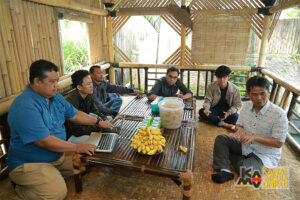
Unpad lecturers encourage the development of Tourism Villages in Sindangsari, Sumedang, through the community service program (PPM) in Padjadjaran University Assisted Villages. The initiation of the development of this tourist village is based on the various potentials found in the town located to the north of the Unpad Jatinangor campus. From the results of the mapping carried out, this village has potential in the form of natural beauty, community creativity, and potential commodities that can be developed into selling points. One of the local wisdom being developed is coffee education. Coffee is a vital commodity owned by Sindangsari. This region already has greenhouse and coffee milling facilities with production reaching 4,000 tons per year and has been tried to be introduced outside West Java. Through this ecotourism, tourists targeting coffee lovers and school students can enjoy the beauty of nature by hiking or camping while learning about coffee.
Development of Tourism Villages in Sindangsari, Sumedang based on local natural resources
2)Assistance in developing feed and livestock centers in Malaka Village, Situraja District, Sumedang
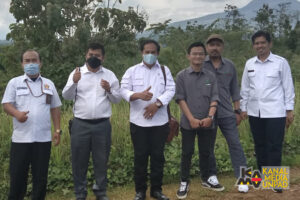
The Situraja District, Sumedang, trust the Faculty of Animal Husbandry at Padjadjaran University to assist in developing feed and livestock centres in Malaka Village, Situraja District, Sumedang. This effort was made to utilize land in Malaka Village to be productive. Assistance is carried out by providing input and inspecting land used as a feed and livestock centre in Malaka Village on Wednesday, 23 March 2022. Regarding this assistance, the Faculty of Animal Husbandry Unpad conducted research to obtain complete information regarding the types of local feed ingredients and their formulations.
Assistance in developing feed and livestock centers in Malaka Village, Situraja District, Sumedang
3)Initiating a quail farming center in Sumedang, West Java.
The Faculty of Animal Husbandry, Padjadjaran University, together with the Quail Breeders Association, initiated the development of quail cultivation in Sumedang. It is hoped that this initiative can make Sumedang a quail farming centre in West Java. As a first step, an audience was held on Monday, May 30 2022. The Unpad Faculty of Animal Husbandry helped improve the quality of human resources for quail breeders. Regarding cultivation, the plan is to develop a type of quail from research conducted by the Faculty of Animal Husbandry Unpad. This research has produced a kind of quail, “Padjadjaran Quail”, with various advantages compared to the general varieties.
Initiating a quail farming center in Sumedang, West Java.
4)Rule of Rector number 26 of 2021 about Resource conservation at Unpad
University includes local biodiversity into any planning and development process (e.g. construction of new buildings) Biological Natural Resources are biological elements in nature consisting of: vegetable (plant) natural resources and animal (animal) natural resources together with the surrounding non-living elements as a whole form an ecosystem. This Rector’s Regulation is prepared as a reference in the utilization of biological natural resources and non-biological in a harmonious and balanced manner, and strive for the realization of sustainability resources and their balance so that they can better support efforts to increase community welfare and the quality of human life in the Unpad environment. Conservation of living and non-biological natural resources is carried out by:
a. Protection of life support systems;
b. Preservation of the diversity of plant and animal species and their ecosystems;
c. sustainable use of living and non-biological natural resources;
d. Optimal, integrated and sustainable management of energy resources, and efficient use of energy in all sectors;
e. Tridharma activities of higher education in a wise and sustainable manner as well as attention to the preservation of biological and non-biological resources.
Conservation Of Biological And Non-Biod Resources In Padjadjaran University
The invasive species referred to in this Rector Regulation are native and non-native species which colonize a habitat massively, which can cause ecological, economic, and social losses, especially at UNPAD. Control of invasive species is carried out by Risk analysis and Application of invasive risk status.
Rector Regulation concerning control of invasive alien species
1)Maintaining local shared land by implementing biopori

Creativity and Entrepreneurship Sports (OKK) Group 21 Padjadjaran University with supervisor Asep Yusuf S.TP., M.T. held outreach regarding biopori infiltration holes and reforestation in the Manglayang Regency R.W. 28 Cinunuk Village area, Cileunyi District, Bandung Regency on Saturday, December 10 2022. This activity had the theme “Neogreen Manglayang” with the slogan “Green Earth for a better life”. This activity aims to increase residents’ awareness regarding clean water and flood problems. At this event, the team explained biopori absorption holes, such as their meaning, benefits, maintenance, location and how to make them. Thirty residents attended this event, and this event collaborated with Perum Perhutani, West Java Banten Regional Division, and local Community Self-Help Groups (KSM). At this event, there was also assistance in the form of 510 plant seeds consisting of jackfruit seeds (160 stems), avocado (65 branches), petai (60 stems), durian (25 stems), longan (100 stems), and soursop ( 100 stems). These seeds were planted in the Manglayang Regency RTH area with assistance from KSM and residents.
Maintaining local shared land by implementing biopori
2)Collaborate with Nature Lovers Activist Club, Universitas Padjadjaran Plants 150 Tree Seedlings in Mount Geulis Springs
In commemorating World Tree Day, BEM Kema Fikom Unpad planted 150 trees near Mount Geulis spring, Sumedang, West Java, last Sunday (20/11/2022). The types of trees planted include 85 mahogany seeds, 50 suren trees, 10 placing trees, and five palm trees. This activity, which was held in the Fikom Membumi work program, was attended by 30 Fikom Unpad students. This activity also collaborated with the Fikom Unpad Activist and Nature Lovers Activist Club (KAPPA) and the Gunung Geulis Communication Forum.
Universitas Padjadjaran Plants 150 Tree Seedlings in Mount Geulis Springs
Land sensitive waste disposal
- Water discharge guidelines and standards
- Policy on plastic waste reduction
- Policy on hazardous waste disposal
1)Management of eco-friendly campus
Padjadjaran University has a Chancellor’s Regulation regarding eco-friendly campus management, one of the concerns of which is water conservation. Water use includes planning, controlling and using groundwater resources with technological management and behavioural changes to ensure water availability in the future.
Management of eco-friendly campus
2)Water discharge scheme
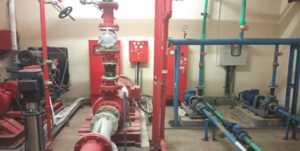
UNPAD uses 3 water sources for its consumption needs, the three sources are PDAM, deep wells, and springs. UNPAD also utilizes water reservoirs to temporarily store water, which will flow directly to each building in UNPAD. Some notable buildings use water directly from deep wells and local water reservoirs. The collected water is used for laboratories, restrooms, rectorate office, lecture hall and Jalatista.
In general, Unpad has 16 wells spread at 16 points around the Unpad Jatinangor campus area. The sixteen wells are divided into 2 pump wells and 14 drilled wells. In the consumption of processed water, Unpad has its own Standard of Procedure. Effluent of gray water and black water treatment through IPAL is a control pond (biological treatment) and then flowed into Check dam and Unpad Basin. Check dam and Unpad Basin water has been widely utilized in the Unpad Jatinangor area, some of which are garden watering, watering experimental gardens, irrigation of residents’ rice fields, and water sources for fire trucks.
3)Water reuse and recycling scheme at Unpad
Padjadjaran University has a water reuse and recycling scheme using nanobubbles and a runoff water harvesting system for fisheries.
1)Prohibition of the use of single-use-plastics
Unpad had Rector Regulation number 10 of 2022 Concerning the prohibition of single-use plastic.
(1) Each work unit is responsible for supporting, maintaining, monitoring, and coordinating to realize the active participation of Unpad people in implementing the prohibition of single-use plastics.
(2) Each work unit is obliged to facilitate the implementation of the prohibition of single-use plastics at Unpad.
(3) Each of the Unpad people is obliged to comply with the prohibition of the use of single-use plastics at Unpad.
(4) Each Unpad guest is directed and notified to be able to support the implementation of the prohibition of the use of single-use plastics when visiting Unpad.
Rule of Rector Number 10 Of 2022 concerning Prohibition of the use of single-use-plastics
1)Toxic waste treatment at Unpad
Mainly, Hazardous and Toxic Waste was collected from academic activities, such as practice and research activities in the laboratory. And storage it at TSA (Temporary storage area) Ciparanje, Universitas Padjadjaran, Jatinangor Campus area. The waste is generally liquid, with a pH unsuitable for the environment (high or low pH). TSA officers at Ciparanje routinely survey each faculty member who produces Hazardous and Toxic Waste to check whether the storage volume is total. If the waste is complete, it will be taken to the TSA at Ciparanje to be stored and handed over to other companies that are experts in handling hazardous and toxic waste. Hazardous and Toxic Waste was obtained from the laboratory, collected and stored in TSA, Ciparanje. Then, the trash will be processed by other companies that are experts in handling hazardous and toxic waste.
Toxic waste treatment at Unpad
2)Management of Eco-Friendly Campus including handling hazardous materials
Padjadjaran University has a Chancellor’s Regulation regarding an eco-friendly campus. One of the concerns in this regulation is the management of hazardous waste by sorting organic, inorganic and residual waste, including hazardous waste.
Management of Eco-Friendly Campus including handling hazardous materials
